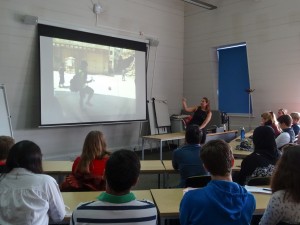As many of you know, I volunteer for
The Jerusalem Youth Chorus,
a programme for Israeli and Palestinian students that empowers young
singers to become leaders for peace in their communities by providing a
space where they can engage one another in musical and verbal dialogue.
One of the biggest challenges faced by the Chorus and its members is
the mandatory service for young Israelis, as the students try to
navigate their values,
security, and friendships. Evyatar Ofri,
one of the founding members of the Chorus and a star of the “Home”
music video, recently had an encounter while on his service that
captures the impacts the choir is trying to make on greater scales.
Regardless of what you think of the military structures and broader
systems of power currently governing his life, Evyatar is reaching out
compassionately and powerfully. Thanks in large part to his time with
the Chorus, Evyatar is equipped not only with the tools to hurt but also
the tools to heal.
Translated from his Hebrew, Evyatar says:
"Today I met one of the most beautiful little girls I've ever seen, an
Arab girl about 10 years old. She was looking for some food in a trash
can about 500 meters away from where I serve in the desert. I noticed
her while I was cleaning our site and took the trash out. She was
standing there with her two donkeys, looking for food in the garbage,
and having no success. She was wearing rags and a smile, barefoot with
wild hair, yet at the same time very cute. I asked her what her name was
in Arabic: Ranin.
"Then I asked her to wait a minute (stanna
shwayeh), and I went as fast as I could to my room, took a box of my
favorite cereal with me, and brought it back to her. The smile that she
had on her face made my day, and even with the language barrier we
understood each other.
"In that moment, this little girl reminded me
that behind every religion, race or gender there are people, and human
beings that just want to be happy and live peacefully, and we should
never forget that being human comes before every conflict."







